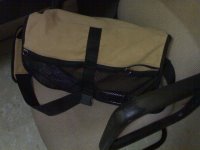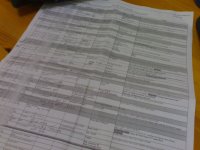The Hospital

Recently I've been watching this
taiwan drama. So far the first 6 episodes has been pretty good, touching on the issues of ethics both in patient care and in work; and also about the politics of the hospital beauracracy.
Although the resus scenes do not quite adhere to ACLS guidelines (CPR for VT?), but it doesn't really bother me, besides I think the cast is good-looking enough to distract me from all that.
"I swear to fulfill, to the best of my ability and judgment, this covenant: Make the care of my patient my first concern; listen to patients and respect their views; recognize the limits of my professional competence; be honest and trustworthy; make sure that my personal beliefs do not prejudice my patients’ care; avoid abusing my position as a doctor; and work with colleague in the ways that best serve patients’ interest."
Enjoy the good times, while they last

I believe there's a cycle in everything.
Like the seasons, if there's warm days; there'll be equally cool days.
Likewise in our lives, if we have good days; there'll be equally bad days.
So enjoy the good days while they last, because bad days may be just around the corner.
Resolutions
It's a bit late, but better late than never.
- Save up more money for our future.
- Start studying.
- Get fit, again.
- Pick up a new sport.
- Bring my family out for more dinners.
- Go on a really long overseas trip.
- Be more proactive!
~~~~~~~~~~~~~~~~~~~~~~~~~~~~~~~~~~~~~~~~~~~~~~~~~
And I hate the rain!
Actionable Intelligence
Over morning coffee with my team, my consultant talked on the topic of actionable intelligence.
Actionable intelligence is the quest for knowledge or information which will make on impact on the management of the patient.
Information which does not alter the management of the patient is useless and should not be actively sought for.
Whereas information which will change the management, should be sought out and acted upon.
ie. Patient has had a total thyroidectomy. The serum calcium levels was done immediately post-op and was low. However patient is totally asymptomatic. Do you act on the result and replace calcium?
If the calcium levels was normal, but the patient exhibited signs of hypocalcemia. Do you not treat?
If the answer is no, why do we do the serum calcium? Why don't we just examine the patient clinically?
Is the serum calcium levels
immediately post-op indicative of the actual calcium levels? And if it is not, why do we still take serum calcium post-op immediately?
~~~~~~~~~~~~~~~~~~~~~~~~~~~~~~~~~~~~~~~~~~~~~~~~~~~~
Don't worry if you are confused. I was confused when I heard it too. But it does provoke thought.
And sometimes I feel that the line between just investigating for the relevant problem and treating it VS investigating widely and ending up with a multitude of new problems is really thin.
And treading on that line is tough and needs experience.
 Believe it or not! Slack lining is a real sport!
Believe it or not! Slack lining is a real sport!
Learning Rounds
I enjoy learning during rounds.
Whereby the consultant / senior doctor asks clinical questions specific and directed to the patient we are managing.
It makes knowledge easier to remember and that much more interesting than reading it in a textbook.
Does that make me a clinician?
I'm always happy when I learn something during rounds. And therefore I was pleasantly surprised and pleased when my registrar took time to teach during rounds.
It seldom happened during my last posting, which everyday felt like a routine.
And I don't think it's a waste of time, or something that can only be done when time is a luxury.
In fact, by teaching during rounds; important points in the management of the patient is highlighted and this ensures that the HO watches out for these points in the management of the patient.
Which, ultimately is good for the patient, and the team, and of course the HO.
Surgical emergencies

Everything in surgery is an emergency.
In fact, I believe the 2 words are synonymous.
I'm a lot more careful in managing GS patients as there are so much more ill.
There are like time-bombs, an emergency could happen anytime.
- SVT secondary to sepsis
- Sudden massive melena
- Septic shock
- Right pleural effusion resulting in desaturation
- Perforated viscus presenting as air under diaphragm
All these are just a preview of the cases I've had to deal with in the last week.
Everyday when I go to work, I'm afraid.
Afraid of what emergency I will encounter again.
Sure, it's a good feeling when your patient pulls through because of your timely intervention, but somehow I feel that as long as they are in the ward, anything can still happen.
And therefore I'm happiest when discharging patients.
Future


Just barely a week into the new posting and I'm not enjoying it very much. Sure the workload is lighter than in CGH ortho, but I worry about stepping on unknown landmines.
And with very ill patients everywhere, an emergency is just waiting to happen.
If I ask myself now, "Do I want to do surgery?"
The answer will be "No."
But when I ask myself, "Am I confident I don't like surgery?"
I don't know that answer myself.
Maybe I need more time as an MO to experience surgery. Maybe I just don't hate medicine that much to say I want to do surgery.
I still remember a senior doctor I really respect saying, "The most complete doctor is a surgeon, because he can do both medicine and surgery."
And his little prep talk on his specialty has got me considering about it as well.
And I really want to be as complete a doctor as I can.
4 more months to go. A limitless future lies in wait. But what lies in wait? I really don't kn0w.
Familiar-Unfamiliar
Welcome back!
Last Day

Picking up my bag and getting ready to leave the house for my last call / day was sentimental.
At least I knew I won't be taking service27 for the next 4 months.

Wearing the oversized and drab baju was nostalgic. Will I ever need to wear it again? Remembering the countless hours that I spent roving the wards in that suit, and how sometimes I wished they had more pockets and was more fitting.
 There were good times and also bad times in that department. But I'm glad to say there's definitely more good times. Although a small department, it's like a small family. Will miss the free biscuits and coffee, and the sumptous pharmaceutical-sponsored lunches.
There were good times and also bad times in that department. But I'm glad to say there's definitely more good times. Although a small department, it's like a small family. Will miss the free biscuits and coffee, and the sumptous pharmaceutical-sponsored lunches.

Stepping into the cold HO2 room, I realised I spent a lot of time here. Being on call 7-8 times per month definitely isn't fun, and it does strain on me physically, mentally and spiritually. With the late dinners with the team and sometimes the occasional NBM when admissions skyrocket, every call has been a great learning experience.

And finally the team list, which the HO's life revolves around. I will miss the patients, which I trust will be in good hands after the changeover. I will also miss the nurses who have helped em learn along the way. Really wanted to take photos with them ( but too shy lar).
A new beginning, a new start. But with that much more experience.
 Recently I've been watching this taiwan drama. So far the first 6 episodes has been pretty good, touching on the issues of ethics both in patient care and in work; and also about the politics of the hospital beauracracy.
Recently I've been watching this taiwan drama. So far the first 6 episodes has been pretty good, touching on the issues of ethics both in patient care and in work; and also about the politics of the hospital beauracracy.






 Just barely a week into the new posting and I'm not enjoying it very much. Sure the workload is lighter than in CGH ortho, but I worry about stepping on unknown landmines.
Just barely a week into the new posting and I'm not enjoying it very much. Sure the workload is lighter than in CGH ortho, but I worry about stepping on unknown landmines. Picking up my bag and getting ready to leave the house for my last call / day was sentimental.
Picking up my bag and getting ready to leave the house for my last call / day was sentimental. Wearing the oversized and drab baju was nostalgic. Will I ever need to wear it again? Remembering the countless hours that I spent roving the wards in that suit, and how sometimes I wished they had more pockets and was more fitting.
Wearing the oversized and drab baju was nostalgic. Will I ever need to wear it again? Remembering the countless hours that I spent roving the wards in that suit, and how sometimes I wished they had more pockets and was more fitting.
 Stepping into the cold HO2 room, I realised I spent a lot of time here. Being on call 7-8 times per month definitely isn't fun, and it does strain on me physically, mentally and spiritually. With the late dinners with the team and sometimes the occasional NBM when admissions skyrocket, every call has been a great learning experience.
Stepping into the cold HO2 room, I realised I spent a lot of time here. Being on call 7-8 times per month definitely isn't fun, and it does strain on me physically, mentally and spiritually. With the late dinners with the team and sometimes the occasional NBM when admissions skyrocket, every call has been a great learning experience. And finally the team list, which the HO's life revolves around. I will miss the patients, which I trust will be in good hands after the changeover. I will also miss the nurses who have helped em learn along the way. Really wanted to take photos with them ( but too shy lar).
And finally the team list, which the HO's life revolves around. I will miss the patients, which I trust will be in good hands after the changeover. I will also miss the nurses who have helped em learn along the way. Really wanted to take photos with them ( but too shy lar). 



